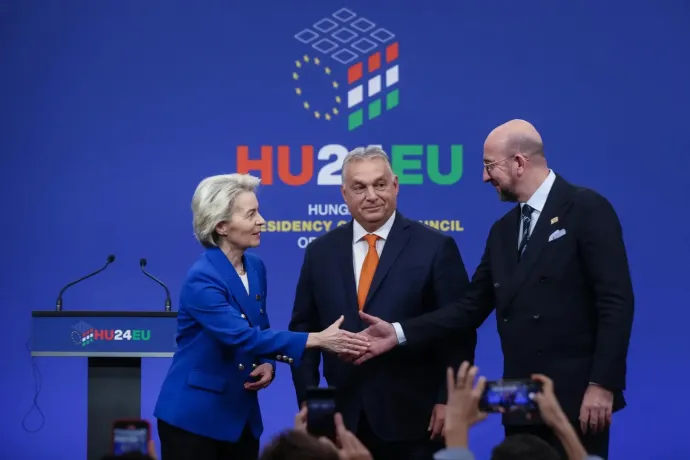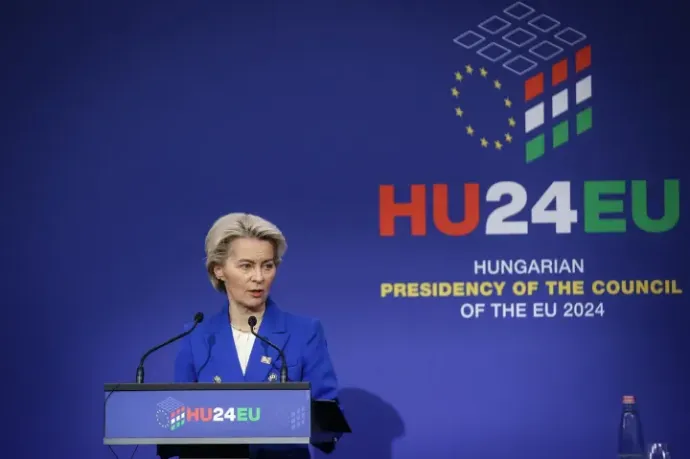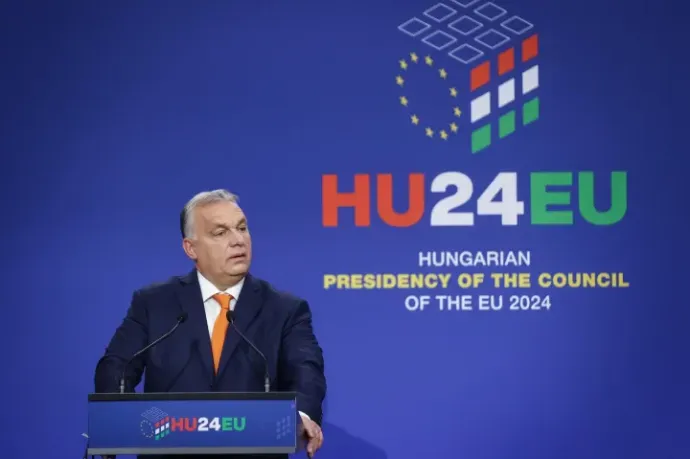Orbán about the Budapest EU summit: I felt that we all want to make Europe great again

Thank you for hosting us, it was very well organised, Charles Michel said, praising the hosts of the European Council meeting in Budapest. The President of the European Council said that the EU's competitiveness, security and common challenges such as climate change were discussed on Friday.
They discussed economic competitiveness in light of the report by former Italian Prime Minister Mario Draghi, which he presented in person. The document stresses the need to eliminate fragmentation and strengthen the single market, Michel, who is due to step down in a few weeks stressed. The declaration released after the meeting maps out new tools for achieving this and these goals will also be included in the next budget, which will come into force from 2028.
On security, he noted that he is convinced that protecting Ukraine is also about protecting European values and the rules of international order.
Unity and trust are the magic ingredient for all this, even if one may disagree with something.
We have shown that we are able to listen to each other and work together for a sovereign Europe,
he said.
Ursula von der Leyen began by addressing the Prime Minister as "Dear Viktor" and thanked him for his hospitality. The head of the European Commission noted the strengths of the European economy, pointing out that the EU has excellent health care and education, which does not depend on our parents' income.

The President of the European Commission had quite a confrontation with Viktor Orbán in the European Parliament in October, which the Prime Minister referred to at the press conference on Friday:
"To save you from asking unnecessary questions – he said to the press – I would like to make it clear in advance that the serious political conflicts between the government and the European Commission are well known to you all. I too have my disputes with the President, but this time Ms Von der Leyen is our guest, we invited her and she accepted the invitation."
(The European Commission, like several member states, has boycotted the Budapest meetings of the Council of Ministers, but no one was absent from Friday's summit of heads of state and government.) "Guests should be treated with courtesy and respect, so there was no sharp debate, in fact no dispute of any kind between us". “We will fight our battles in Brussels.”
Moreover, on the main issue, competitiveness, "we were in full agreement". Orbán announced that for the next five years, the focus will be on competitiveness, and that all new legislation should be tested in this respect. The Capital Markets Union will be developed further and steps will be taken to create a defence industry base. A "Budapest Declaration" on the subject will also be released. (Normally, each meeting concludes with conclusions, although this was only an informal meeting.)
"After today's deliberations, I am optimistic.
I felt that no one wants to manage decline, but we all want to make Europe great again, since the Americans have decided that they will make America great.
And if the Americans have decided to make America great, there is only one answer: we are going to make Europe great," Orbán said, quoting Donald Trump's campaign slogan and the motto chosen for the Hungarian presidency of the Council. When the EU's previous programme, the Lisbon Agenda was adopted for the first decade of the 2000s, the plan was to create the most competitive area from Lisbon to Vladivostok. But "times have changed", Orbán said.
The summit was "a good little gathering with nice results". Orbán said that everyone kept saying that Hungary was isolated, that nobody loves it or at least it's not liked, that there would be no summit because the leaders would not come, but in the end, here we are, cooperation has been good and we adopted an agreement that – according to Orbán – everyone thought was impossible. "I am a nationally minded fellow, I look at the EU institutions from a patriot's point of view, but it was easy to agree on competitiveness because it's not ideological, Orbán said, adding that the party family he was one of the founders of is also called "Patriots for Europe" and not against it.
He joined the other two speakers in condemning the anti-Semitic attacks in Amsterdam. He said that he wished that people there could live in peace like those in Budapest, which is home to "perhaps the largest synagogue in Europe".
Hungary is particularly tolerant because it is a meeting place for different cultures, of the east and west, north and south.
Orbán said that if one of the 27 is alone, it is not isolation, it is democracy. He mentioned that in 1988, he was alone in his family with believing that the socialist system was about to collapse, and today the Hungarian government is no longer alone with its approach to migration, because it hasn't been isolated, but has always been part of the dialogue.

On assisting Ukraine, Von der Leyen said that as part of the G7, they had agreed to provide support, with everyone (including the U.S.) taking their fair share (Recently, after Trump was elected in the US, Orbán called the fate of the loan already agreed by the EU the biggest question regarding support for Ukraine.) The role of North Korea and Iran in the war shows that the EU and the US have common interests, she said.
"It is not my job to tell Ukraine what to do," Orbán stressed. This is only up to the Ukrainians, and they have chosen to fight. And they are doing so valiantly, he said, adding that when he travelled to Kyiv in July (and then to Moscow, "for which I received much criticism, but I don't want to go into the details about that now") he explained to the Ukrainian president that he believed time was not on his side.
It is perfectly clear to him that both sides are convinced otherwise, which is why he has tried to create the broadest possible pro-peace camp and insulate Hungary from the effects of the war. He is not trying to tell the Ukrainians what to do, it is their future, and they deserve a better one than what it looks like now.
What was this meeting?
Friday marked the second day of the Budapest double summit, which the government has described as the biggest diplomatic event in Hungary's history.
On the first day, heads of state and government from almost every country in Europe came to the Puskás Arena to hold multilateral and even one-to-one meetings. Only EU leaders remained for Friday, with German Chancellor Olaf Scholz arriving late. He skipped most of Thursday's programme because of the German government crisis, which, combined with Donald Trump's election victory in the US, dominated the day's agenda.
As EU leaders arrived at the informal meeting of the European Council on Friday, they focused on economic competitiveness, on which they intended to adopt a declaration by the end of the meeting if all goes according to plan. Increasing the European Union's competitiveness is one of the main objectives of the Hungarian presidency of the EU Council. The double summit was held in Budapest due to Hungary currently holding the presidency, and this was the highest-level political event of the presidency.
What is in the Budapest Declaration?
At the end of the meeting, a document called the Budapest Declaration was issued. The participants agreed to "make the Union more competitive, productive, innovative and sustainable, building on economic, social and territorial cohesion, and ensuring convergence and a level playing field both within the Union and globally."
The declaration welcomes the reports prepared by Enrico Letta and Mario Draghi. During the debate on the former in the European Parliament in October, Fidesz noted that "we shouldn't centralise in cases where smaller or less developed countries would be disadvantaged". On the latter, the Hungarian governing party shied away from the idea of a joint loan and considered the plan a mixed picture. The now unanimously agreed statement notes that the two reports identify critical challenges and make forward-looking recommendations.
The Heads of State and Government concluded that the package of proposals "provides a solid basis on which to continue our work with ambition".
For more quick, accurate and impartial news from and about Hungary, subscribe to the Telex English newsletter!